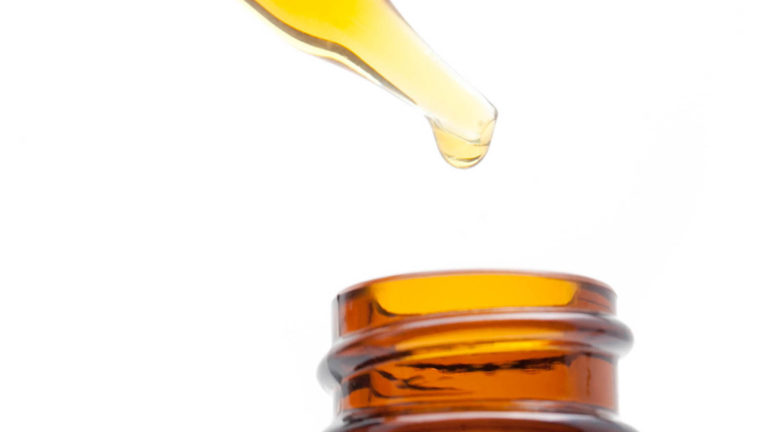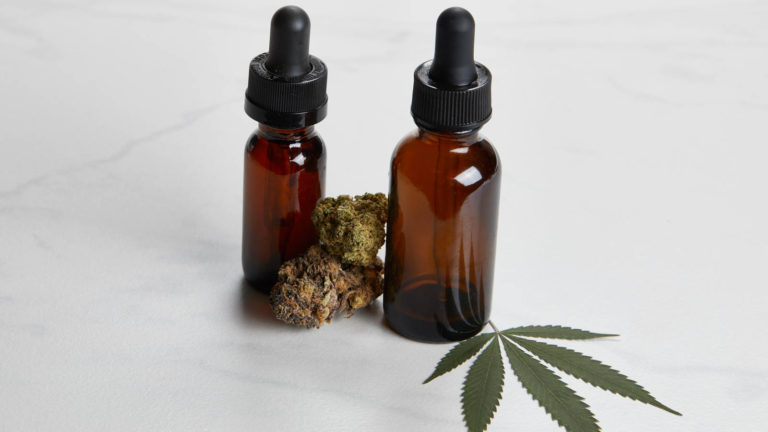The rules and regulations around cannabidiol (CBD) in Alabama seem murky on the surface, yet the Yellowhammer State is one of the most CBD-friendly states in the country. Consumers in Alabama enjoy general access to CBD and CBD products that meet the legal definition as outlined in the 2018 Farm Bill, while licensed Alabama-based growers and processors can create and sell industrial hemp products.
What is CBD?
Cannabidiol is a non-intoxicating molecule found in cannabis. It is the second-most abundant-cannabinoid in the plant after THC and has many potential therapeutic benefits, including analgesic, anti-inflammatory, anti-anxiety, and seizure-suppressant properties. CBD can be sourced from either marijuana or hemp plants.
 Photo by: Gina Coleman/Weedmaps
Photo by: Gina Coleman/WeedmapsImage lightbox

Why is CBD sometimes illegal?
Even though industrial hemp doesn't produce enough THC to intoxicate consumers, all varieties of cannabis, including hemp, were swept into the category of Schedule 1 narcotics by the 1970 Federal Controlled Substances Act. The law defined cannabis as a substance with no accepted medical use, a likelihood for addiction, and a high potential for abuse.
In 2018, Congress passed the Farm Bill and legalized hemp cultivation, creating a pathway to remove cannabis from Schedule 1. The Farm Bill defined hemp as cannabis that contains less than 0.3% THC by weight and marijuana as cannabis with more than that amount. Hemp-derived CBD was thus removed from its Schedule 1 designation, but CBD derived from the marijuana plant is still considered federally illegal because of marijuana's federally illegal status. Hemp is considered an agricultural commodity, but still must be produced and sold under specific federal regulations, which were not finalized when hemp was legalized.
The Farm Bill also endowed the Food and Drug Administration (FDA) with the ability to regulate CBD's labeling, therapeutic claims, and presence in foods or drinks. Despite the Farm Bill's passage, the FDA has issued a directive that no CBD, even hemp-derived, may be added to food or beverages or marketed as a dietary supplement. As time passes, the FDA has begun re-evaluating that stance on CBD products but has yet to revise rules or specifically regulate CBD products. The FDA's slow movement has created further confusion on the state level. The FDA has historically been strict when it comes to health claims or content that could be understood as medical advice — and makes no exception for CBD. In July 2019, the FDA sent a letter to Curaleaf warning that the CBD maker was making unproven claims about its effectiveness in treating such conditions attention deficit/hyperactivity disorder (ADHD), Alzheimer's disease, Parkinson's disease, cancer, and opioid withdrawal. In April 2019, the FDA also warned three other CBD makers over making unproven health claims.
Hemp production and sale, including its cannabinoids and CBD specifically, remain tightly regulated federally. The Farm Bill provides that individual states may also regulate and even prohibit CBD cultivation and commerce. States may attempt to regulate CBD in food, beverage, dietary supplements, and cosmetic products independently of the FDA's rules.
Alabama CBD laws
Before the 2018 Farm Bill, Alabama had a budding, though restrictive, medical CBD program in place. On April 1, 2014, Republican Gov. Robert Bentley signed SB 174, known as Carly's Law, which allowed an affirmative defense for individuals using CBD to treat a debilitating epileptic condition. Patients could receive a prescription for possession or use of CBD only through the University of Alabama-Birmingham. This made access to CBD difficult, as the term “prescribe” is a federal term; most legalized medical marijuana states allow doctors to “recommend” it.
On May 4, 2016, Bentley signed HB 61. Known as Leni's Law, named for Leni Young of Alabama who successfully treated her seizures with CBD. The act widened access to CBD by expanding the definition of qualifying conditions to include specified debilitating conditions that produce seizures. However, access to CBD was still highly restricted and the only FDA-approved form was GW Pharmaceuticals' Epidiolex.
Following the 2014 Farm Bill passed by Congress and signed by President Barack Obama, the Alabama Legislature passed the Alabama Industrial Hemp Research Program Act in 2016, tasking the Alabama Department of Agriculture and Industries (ADAI) with the development of a licensing and inspection program for the production of industrial hemp. The ADAI slowly drafted and finalized regulations in September 2018, only months before the 2018 Farm Bill was signed, which broadly legalized CBD and CBD products that contained less than 0.3% THC by weight.
Following the passage of the 2018 Farm Bill, Republican Alabama Attorney General Steve Marshall affirmed the legality of CBD products that are sold by a licensed vendor and contain no more than 0.3% THC by weight. However, Marshall cautioned buyers to be careful when purchasing, as Alabama has yet to draft regulations for the testing and labeling of CBD products.
While CBD products with less than 0.3% THC are now broadly legal and available for sale and purchase in Alabama, the ADAI still regulates and licenses industrial hemp growers and processors under the 2014 Farm Bill's rules. They will continue to operate under the pilot program until the FDA finalizes industrial hemp regulations and reviews and approves the rules submitted by the ADAI.
Relation to Federal Law
In July 2019, Republican Gov. Kay Ivey signed SB 225, which redefined and rescheduled CBD to align with federal definitions and allowed Alabama pharmacies to sell CBD products.
While the ADAI will collaborate with FDA rules to create regulations in accordance with the 2018 Farm Bill, the Alabama Industrial Hemp Research Program remains in effect. CBD products are legal, but it is illegal for growers and processors to work with industrial hemp in Alabama without a permit.
Licensing Requirements
The Alabama Industrial Hemp Research Program required applicants to submit all materials and application fees annually, including criminal background checks. Growers and processor applicants must pay a $200 application fee and a $1,000 annual fee upon approval.
Testing Requirements
At the ADAI commissioner's discretion, the department requires regular sample lab testing to confirm that the crop or processed hemp product contains less than 0.3% THC. The grower or processor is responsible for the lab testing fee, which is approximately $200 per sample. There are no requirements for labeling or posting test results for participants in the pilot program.
Sale Regulations
There are no regulations for sales of products that meet the 0.3% THC threshold of CBD. Business or individuals that sell any cannabis product containing more than the legal amount of THC can be charged with a felony, and face a sentence of two to 20 years in prison and a find of up to $30,000. Sales of cannabis to a minor can be punishable by a 10 years-to-life sentence and a maximum $60,000 fine.
Cultivation Requirements
Participants in the Alabama Industrial Hemp Research Program are required to submit several reports regularly to the ADAI. Failure to submit any report, reporting false information, not paying fees, or growing a hemp product that tests above the legal THC limits are all in violation of ADAI regulations. These violations are subject to civil penalties up to $500 and disciplinary sanctions including revocation of an application.
Growers also are subject to existing Alabama code regarding possession, cultivation, sale, or use of cannabis above the legal THC limits. The cultivation or manufacturing of cannabis can result in a sentence of two years to life and a fine of up to a $60,000, depending on the degree of manufacture.
Alabama CBD possession limits
There are no possession limits on CBD products in Alabama, as long as the product contains no more than 0.3% THC.
 Photo by: Gina Coleman/Weedmaps
Photo by: Gina Coleman/WeedmapsImage lightbox

The possession of any amount of cannabis above the legal limit of THC content is a misdemeanor, which can be punished by up to one year of jail and a maximum fine of $6,000.
Where to buy CBD in Alabama
Alabama consumers can purchase CBD products both in-person and online. Typically, CBD products are sold at CBD-specific shops and wellness and health food stores. In Alabama, pharmacies can sell CBD products over the counter, as long as they are sourced from legal producers and contain no more than 0.3% THC.
Consumers may also purchase CBD products online, typically directly through a specific brand's website. Many online checkout processes work for CBD companies based in the United States, but some online processors consider CBD as a “restricted business,” so not all payment methods may be available.
How to read CBD labels and packaging
As the FDA slowly determines the rules around CBD's legality, the buzzwords and descriptors on a product's label could raise potential red flags about a product's quality or content. How a CBD product is labeled and marketed plays a critical role in whether the FDA determines it to be lawful, so it's important to understand what certain words or numbers indicate.
CBD product labels should not make claims about any therapeutic or medical results, which the FDA would classify as a drug and in violation of current regulations. Reputable CBD companies typically adhere to stricter labeling standards voluntarily to give their consumers better understanding and access to higher-quality products. Buzz words, such as “pure” or “organic,” have no scientific meaning for hemp and could be misleading marketing slogans.
The type of CBD should also be clearly stated. The current definitions include the following:
- Full-spectrum CBD oil contains cannabis-derived terpenes, trace amounts of THC, and other cannabinoids.
- Broad-spectrum CBD contains a similar array of cannabinoids and terpenes but removes the THC trace amounts through processing.
- CBD isolate has been stripped of all other compounds, resulting in a crystalline powder that is 99% pure CBD.
Consumers typically should look for the following on their CBD labels:
- Amount of active CBD per serving.
- Supplement Facts label, including other ingredients.
- Manufacturer/distributor name.
- Net weight.
- Suggested use.
- Full-spectrum, broad-spectrum, or isolate.
- Batch or date code.

